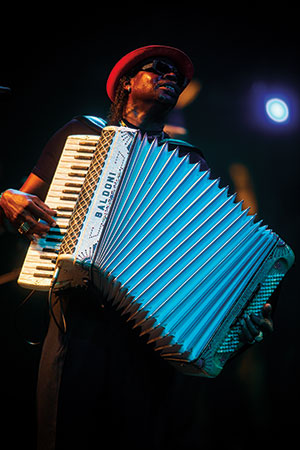
C.J. Chenier will perform for an online version of Texas Folklife’s Accordion Kings & Queens Concert at Houston’s Miller Outdoor Theatre this Friday night. Photo by Nathan Lindstrom
When folks are locked down, can there still be folklife?
That’s the existential question that Texas Folklife has been asking. As a nonprofit organization whose mission is to preserve Texas traditions and cultures through person-to-person contact in the forms of workshops, apprentice programs, and performances, these are strange times.
“It’s an acute moment for folk and traditional arts because it’s such a tangible thing: We get people together to celebrate cultural connections and traditions,” Executive Director Charlie Lockwood says. “When you can’t do it in person, how do you do it?”
Like other organizations struggling to remain viable during the pandemic, Texas Folklife has been forced to adjust its operations.
Their efforts will be on display at 7 p.m. Friday, Nov. 20, when zydeco royalty CJ Chenier performs a concert at the Miller Outdoor Theatre in Houston. Taking place exclusively via livestream, the show will be a truncated, scaled-down version of Texas Folklife’s biggest annual event, the Accordion Kings and Queens concert, which is usually staged the first Saturday in June at the Miller.
While the theater will not be open to the public, the stage and production crew will be working on the show with Chenier, a Houston-based accordionist. “It’s going to sound good and look great,” Lockwood says. “CJ’s excited to perform. A lot of his big festival dates were cancelled this year. And we will be able to do our job of presenting the rich accordion traditions of the state in a slimmed down format. We hope to do it live again next year, but by doing this we’ll see what’s viable.”
One upside is the potential to reach an audience greater than the 5,000 or so who show up for the live event in June.
From where Lockwood sits, Texas Folklife is in a much better place than it was in March, when he had to cancel seven events (most relating to the statewide Big Squeeze competition for young accordionist), shut down the nonprofit’s office, and go into lockdown.
“Overnight, the entire ecosystem changed,” he says. “’When things get back to normal’ is a phrase I’ve heard a lot. We’re not going back to normal. This is a new thing now. This is a new paradigm. Our team has been preparing to be remote, be virtual, and do things we can’t do in person. We work with so many venues that are run by local and state government, and we don’t have a timetable for when those venues can host large gatherings, what’s allowed at the state level. So while we’re trying to set up some smaller in-person events for next spring, we’re in this hybrid model for the foreseeable future.”
That translates into virtual exhibits as has been done for Texas Quilts, moving the annual Big Squeeze competition for the best young accordion players online where entrants’ videos were judged, and using tools like Zoom to continue Texas Folklife’s expansive Apprenticeship Program for Folk & Traditional Arts. The program provides grants to mentors to teach an apprentice skills in creative endeavors such as broom-making, accordion-building, chair-caning and weaving, cowboy art, Chinese bamboo silk ensemble, quilting, and boot-making.
“Some of the [apprenticeship] teams have been able to do it virtually,” Lockwood says. “Some have been able to do it in person safely, at a distance outside working together. We were able to do a virtual event showcasing several apprenticeships earlier this summer with live video feeds from their different locations.”
Texas Folklife’s planned exhibits on Texas Quilts, Veterans Art, and Howard Rains, a fiddler and a painter of other fiddlers, have gone virtual. The Festival of Fiddling, a celebration of the diversity of the fiddle in Texas music, normally staged at the Twin Sisters Dancehall south of Blanco the first Saturday in December, will be live-streamed.
Exploring virtual ways of preserving traditions and cultures is a noble idea, but some folks, particularly older, rural people that Texas Folklife focuses on don’t have internet access.
“We’re trying to figure it out like everyone else,” Lockwood says. “We’ve embraced the technology. A lot of our staff is younger, they’re creative. I’ve encouraged them to explore solutions to problems, rather than waiting for things to go back to normal. Our stories program is teaching kids at Akins High School in Austin how to use online tools like Zencaster to interview people for stories.”
Texas Folklife has also tapped into an informal network of local and state nonprofits, folklife organizations, folklorists, Smithsonian employees, and entities including the National Council for the Traditional Arts to strategize how to cope with the coronavirus pandemic. The movement has been codified into the website Living Traditions Network.
Whether or not the transition to online and virtual is effective remains to be seen. “People getting together and sharing culture and tradition, that happens anyway, whether or not we’re there to celebrate or document it,” Lockwood says. “As an organization, we have to examine, how do we highlight that? How do we support people who will continue to learn from each other, express cultural identity and express artistic ways of seeing the world?
“That part is still going to happen. The format and how it happens might be different. Direct funding to organizations like us is down this year. And it could be down for years to come. That’s where the challenge is. How do we continue to financially support what we do? We did get a PPP grant through the SBA and some federal relief funds from the arts endowment. Now we’re turning our attention to individual support to keep things going. It’s threatening but you could look at it as a transformation.”
If only the plague would do its part and go away.








